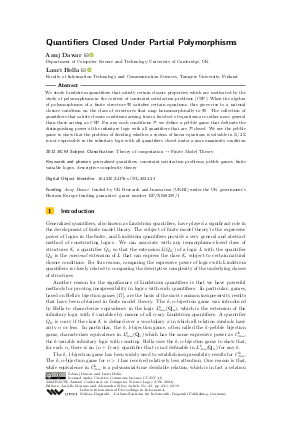Quantifiers Closed Under Partial Polymorphisms
Authors
Anuj Dawar  ,
Lauri Hella
,
Lauri Hella 
-
Part of:
Volume:
32nd EACSL Annual Conference on Computer Science Logic (CSL 2024)
Part of: Series: Leibniz International Proceedings in Informatics (LIPIcs)
Part of: Conference: Computer Science Logic (CSL) - License:
 Creative Commons Attribution 4.0 International license
Creative Commons Attribution 4.0 International license
- Publication Date: 2024-02-07
File

PDF
LIPIcs.CSL.2024.23.pdf
- Filesize: 0.75 MB
- 19 pages
Document Identifiers
Subject Classification
ACM Subject Classification
- Theory of computation → Finite Model Theory
Keywords
- generalized quantifiers
- constraint satisfaction problems
- pebble games
- finite variable logics
- descriptive complexity theory
Metrics
- Access Statistics
-
Total Accesses (updated on a weekly basis)
0PDF Downloads0Metadata Views
Abstract
We study Lindström quantifiers that satisfy certain closure properties which are motivated by the study of polymorphisms in the context of constraint satisfaction problems (CSP). When the algebra of polymorphisms of a finite structure 𝔅 satisfies certain equations, this gives rise to a natural closure condition on the class of structures that map homomorphically to 𝔅. The collection of quantifiers that satisfy closure conditions arising from a fixed set of equations are rather more general than those arising as CSP. For any such conditions 𝒫, we define a pebble game that delimits the distinguishing power of the infinitary logic with all quantifiers that are 𝒫-closed. We use the pebble game to show that the problem of deciding whether a system of linear equations is solvable in ℤ / 2ℤ is not expressible in the infinitary logic with all quantifiers closed under a near-unanimity condition.
Cite As Get BibTex
Anuj Dawar and Lauri Hella. Quantifiers Closed Under Partial Polymorphisms. In 32nd EACSL Annual Conference on Computer Science Logic (CSL 2024). Leibniz International Proceedings in Informatics (LIPIcs), Volume 288, pp. 23:1-23:19, Schloss Dagstuhl – Leibniz-Zentrum für Informatik (2024)
https://doi.org/10.4230/LIPIcs.CSL.2024.23
BibTex
@InProceedings{dawar_et_al:LIPIcs.CSL.2024.23,
author = {Dawar, Anuj and Hella, Lauri},
title = {{Quantifiers Closed Under Partial Polymorphisms}},
booktitle = {32nd EACSL Annual Conference on Computer Science Logic (CSL 2024)},
pages = {23:1--23:19},
series = {Leibniz International Proceedings in Informatics (LIPIcs)},
ISBN = {978-3-95977-310-2},
ISSN = {1868-8969},
year = {2024},
volume = {288},
editor = {Murano, Aniello and Silva, Alexandra},
publisher = {Schloss Dagstuhl -- Leibniz-Zentrum f{\"u}r Informatik},
address = {Dagstuhl, Germany},
URL = {https://drops.dagstuhl.de/entities/document/10.4230/LIPIcs.CSL.2024.23},
URN = {urn:nbn:de:0030-drops-196662},
doi = {10.4230/LIPIcs.CSL.2024.23},
annote = {Keywords: generalized quantifiers, constraint satisfaction problems, pebble games, finite variable logics, descriptive complexity theory}
}
Author Details
Funding
- Dawar, Anuj: funded by UK Research and Innovation (UKRI) under the UK government’s Horizon Europe funding guarantee: grant number EP/X028259/1.
References
-
N. Alon. Tools from higher algebra. In Handbook of Combinatorics (Vol. 2), pages 1749-1783. MIT Press, 1996.

-
A. Atserias, A. Bulatov, and A. Dawar. Affine systems of equations and counting infinitary logic. Theoretical Computer Science, 410(18):1666-1683, 2009.

- L. Barto, A. A. Krokhin, and R. Willard. Polymorphisms, and how to use them. In A. A. Krokhin and S. Zivný, editors, The Constraint Satisfaction Problem: Complexity and Approximability, volume 7 of Dagstuhl Follow-Ups, pages 1-44. Schloss Dagstuhl - Leibniz-Zentrum für Informatik, 2017. URL: https://doi.org/10.4230/DFU.Vol7.15301.1.
- V. G. Bodnarchuk, L. A. Kaluzhnin, V. N. Kotov, and B. A. Romov. Galois theory for post algebras. i. Cybernetics, 5(3):243-252, 1969. URL: https://doi.org/10.1007/BF01070906.
- A. A. Bulatov. A dichotomy theorem for nonuniform CSPs. In 58th IEEE Annual Symposium on Foundations of Computer Science, FOCS, pages 319-330, 2017. URL: https://doi.org/10.1109/FOCS.2017.37.
-
J-Y. Cai, M. Fürer, and N. Immerman. An optimal lower bound on the number of variables for graph identification. Combinatorica, 12(4):389-410, 1992.

- A. Dawar, E. Grädel, and M. Lichter. Limitations of the invertible-map equivalences. arXiv, abs/2109.07218, 2021. URL: https://arxiv.org/abs/2109.07218.
- A. Dawar, E. Grädel, and W. Pakusa. Approximations of isomorphism and logics with linear-algebraic operators. In 46th International Colloquium on Automata, Languages, and Programming, ICALP 2019., pages 112:1-112:14, 2019. URL: https://doi.org/10.4230/LIPIcs.ICALP.2019.112.
-
A. Dawar, M. Grohe, B. Holm, and B. Laubner. Logics with rank operators. In Proc. 24th IEEE Symp. on Logic in Computer Science, pages 113-122, 2009.

-
A. Dawar and B. Holm. Pebble games with algebraic rules. Fundam. Inform., 150(3-4):281-316, 2017.

-
H-D. Ebbinghaus and J. Flum. Finite Model Theory. Springer, 2nd edition, 1999.

-
P. Erdös and H. Sachs. Reguläre Graphen gegebener Taillenweite mit minimaler Knotenzahl. Wiss. Z. Martin-Luther-Univ. Halle-Wittenberg Math.-Natur. Reihe, 12(251-257):22, 1963.

-
T. Feder and M.Y. Vardi. Computational structure of monotone monadic SNP and constraint satisfaction: A study through Datalog and group theory. SIAM Journal of Computing, 28:57-104, 1998.

-
David Geiger. Closed systems of functions and predicates. Pacific Journal of Mathematics, 27(1):95-100, 1968.

- E. Grädel and W. Pakusa. Rank logic is dead, long live rank logic! J. Symb. Log., 84:54-87, 2019. URL: https://doi.org/10.1017/jsl.2018.33.
- J. A. Grochow and M. Levet. On the descriptive complexity of groups without abelian normal subgroups. arXiv, abs/2209.13725, 2022. URL: https://doi.org/10.48550/arXiv.2209.13725.
-
L. Hella. Logical hierarchies in PTIME. Information and Computation, 129:1-19, 1996.

- L. Hella. The expressive power of CSP-quantifiers. In 31st EACSL Annual Conference on Computer Science Logic, CSL, pages 25:1-25:19, 2023. URL: https://doi.org/10.4230/LIPIcs.CSL.2023.25.
- L. Hella and H. Imhof. Enhancing fixed point logic with cardinality quantifiers. J. Log. Comput., 8(1):71-86, 1998. URL: https://doi.org/10.1093/logcom/8.1.71.
- Peter Jonsson, Victor Lagerkvist, Gustav Nordh, and Bruno Zanuttini. Strong partial clones and the time complexity of SAT problems. J. Comput. Syst. Sci., 84:52-78, 2017. URL: https://doi.org/10.1016/J.JCSS.2016.07.008.
- M. Lichter. Separating rank logic from polynomial time. In 36th Annual ACM/IEEE Symposium on Logic in Computer Science, LICS. IEEE, 2021. URL: https://doi.org/10.1109/LICS52264.2021.9470598.
- B. A. Romov. The algebras of partial functions and their invariants. Cybernetics, 17(2):157-167, 1981. URL: https://doi.org/10.1007/BF01069627.
- Henning Schnoor and Ilka Schnoor. Partial polymorphisms and constraint satisfaction problems. In Nadia Creignou, Phokion G. Kolaitis, and Heribert Vollmer, editors, Complexity of Constraints - An Overview of Current Research Themes [Result of a Dagstuhl Seminar], volume 5250 of Lecture Notes in Computer Science, pages 229-254. Springer, 2008. URL: https://doi.org/10.1007/978-3-540-92800-3_9.
- D. Zhuk. A proof of the CSP dichotomy conjecture. J. ACM, 67:30:1-30:78, 2020. URL: https://doi.org/10.1145/3402029.
